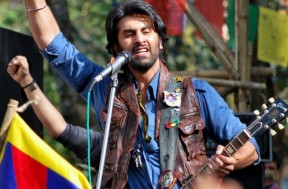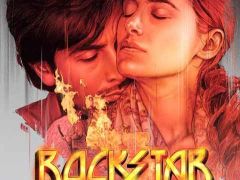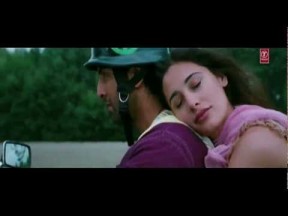An aside. There is a moment in Imtiaz Ali’s Love Aaj Kal, when after being mugged by two hoodlums in a strange country, Saif Ali Khan sits beaten and broken by more than just the blows he has just received. And suddenly, the face of Meera, a woman he thought he had forgotten flashes before his eyes. It is a moment of unbearable clarity and bittersweet pain. He says something to the effect of, “Meera? Yeh tum ho?” It is not a question. It is an answer. Now he knows why his success, his fulfilled ambitions are not enough. Why he has been chronically out of sorts. It is because, he once had love. The real deal. And now he does’nt. This is the keynote of all of Ali’s cinema. This knowledge that when you find love, you are set for something higher than success. And that to lose love is like Jewish author Bernard Malamud would say, the biggest human tragedy of all. In Imtiaz Ali’s cinema, love is not an option. It is a compulsion. Like Ranbir Kapoor’s Jordan says to Nargis Fakhri’s Heer in Rockstar, “Meri setting sirf tere saath hai.”
And he tells her even before she can see it that without him, she will never be happy. Her body literally will stop generating blood. For Ali, love is not song and dance. It is not a ‘meet cute’ moment. It is that shared space of familiar jokes, comforting recognition of each other’s essential selves, total dependence for validation and warmth and understanding and yes, passion that two people completely in love, cannot experience with anyone else.
In Jab We Met, it is the night spent in a seedy hotel in Ratlam that bonds Kareena Kapoor’s Geet and Shahid Kapoor’s Aditya for life. In Love Aaj Kal, it is a ‘ Jai wali feeling‘ that Meera can’t experience with anyone else and in Rockstar, it is the bike rides shared by an aristocratic Kashmiri beauty Heer and an awkward, Jim Morrison wannabe Janardhan Jhakar, that culminate into a certain kind of joy that exists nowhere else. In a key moment of the film, Heer encloses Jordan in a cloudy white sheet and says, “Sab chale gaye…yeh hamari duniya hai.” And he says, “Main bahar jee nahin paaonga.” And these are portentous words. From a boy who faked a heartbreak while eating a samosa, Jordan grows into a man who can’t function without Heer.
And they both don’t know what is it that binds them together. The hero in a Imtiaz Ali film does not speak in Yash Chopra’s refined love talk. He does not mention phrases like ‘sanson ki khushboo‘ and ‘ankhon ki masti.’ There is no formality between Ali’s lovers. Here too no matter how many painful years have yawned between them, Jordan always addresses Heer as, “Jungli Jawani.” After a soft porn film they watched together in a rundown theatre in Delhi. The physicality creeps in very late after they have established within their hearts that there is something beyond time and space between them. From a hug before Heer’s wedding to a kiss years later, they traverse the distance between deep friendship and uncontrollable desire with a sense of wonder and fear. “Magic touch,” he says once holding her, “what is this?” “I don’t know,” she says,”it just is.”
And that is what Ali says through each of his films. Love just is and when it is love, you can’t run from it, hide from it, deny it or fight it.
Rockstar is not a linear film and darts back and forth between a love story that waxes and wanes and then grows to a full tide and there is the dysfunctional Jordan who loses the Janardhan and his innocence as love leaves and success walks in, bringing with it a hysterical fan following, manipulative music moghuls (there is a hilarious scene where Piyush Mishra, a vulgarly rich music magnet is being massaged by a muscled wrestler while he conducts a business deal), lawlessness and an adrift spirit who like the nadaan parinde in Irshaad Kamil’s song, wants to go home but can’t find it.
Then there is the absolutely delightful visual palette of India’s sights, sounds and nuances that few film makers ever bother to discover in their hurry to fly abroad to shoot song sequences. The moving sequence in Nizammudin where our hero after having been kicked out of his home, finds shelter and jams with the Sufi qawaals and shares their music, their food and their philosophy. It is such a subtle and beautiful comment on the shared legacy that we must value. Then the hilarious kirtans where auntyjis dance in delirium. The Delhi winters. The university canteen banter. Handknitted sweaters. The staggeringly beautiful Kashmir and the unfamiliar cadences of a Pandit wedding. Anil Mehta captures Delhi, Kashmir and then Prague as if he were painting various stages of winter within and without. And the music. After a long long time, Rehman gives us a score that is bigger than our ability to register it in just one season. This music is almost epic in proportions. Inevitable like a force of nature. Like molten gold, Mohit Chauhan’s voice pours itself in every empty space and owns it. And Ali never really fails to say it like it is with his dialogues.
There is the absolutely fantastic Kumud Mishra as Jordan’s mentor, the heartwarming moments where the late Shammi Kapoor lights up the screen and there is Ranbir Kapoor. It is ironical that while 40 something superstars are trying to convince us that they are teenagers, here is a 20 something star who wants to show us he is bigger than his years when it comes to feeling a role and living it inside and out. This is a performance that is both technique and heart. Internalised, deeply felt and nuanced on the outside. Here is an actor. In capital letters. Fakhri is absolutely worthy of the passion she inspires and will be hopefully given meaty roles rather than just pretty ornamental cameos.
Though the film reminds you in places of Walk The Line, it never really arrives at that full circle moment at Folsom prison where finally Johnny Cash becomes a man bigger than his pain. ‘Sada Haq, Aethe Rakh,’ could have been contextualised in issues bigger than Jordan’s angst but he never really rises above his own story. And that is the only flaw in the film.
There is a punchline in the film which is not a line at all but a moment. When a sea of people is in a frenzy before Jordan. He is possibly India’s biggest rockstar. No longer the wannabe Jim Morrison. But himself. Complete with a heartbreak that defines his music. And then there is a hush and there she is. The woman who promised to protect him in that little world under a cloudy white sheet. Hush. And then she is gone. And there is just the crowd. It is an unbearably sad moment. And is the message of Ali’s film and of all his films. Your spirit needs a home. It needs to love and be loved. And without it, the world even when crowded is empty. Go watch Rockstar because in Imtiaz Ali we finally have a rockstar director, an auteur of the kind of love we all want to live.
Reema Moudgil is the author of Perfect Eight (http://www.flipkart.com/b/books/perfect-eight-reema-moudgil-book-9380032870?affid=unboxedwri )









Wow! One of the most beautiful reviews of the movie I have read on the internet.
Great review! I watched the movie just yesterday, and loved it too 🙂
I may agree with you, disagree with you… but does it matter? I’m just grateful that you wrote down these words after an honest contemplation. Just like, I am grateful to Imtiaz Ali. It was his movie, a story that he placed on a slow burner for 10 years. Today, he made the movie and he stuck to his story, his characters, didn’t cave in to the market demands, extremely brave. Trust me, producers can really bastardize a film. He made this film for himself. And then let us watch it too. Life has flaws, its not tangible at times. And I didn’t see any Ranbir in the movie. I only saw JJ and Jordan. Love, as you correctly unravel, and as Imtiaz aptly depicted with brazen zeal, is not about ‘sanson ki khushboo’ or ‘ankhon ki masti’. It is in that moment of innate smile and careless giggle that trickles out when its there. I love you for writing this, and be forever grateful to Imtiaz Ali for staying true to himself.
An awesome review…. heartfelt expressions.. and totally agree with you..
Way to go Reema!!!!!!!
Your review made me cry…
[…] : Another brilliant write-up by Reema Moudgil at Unboxed Writers. She captures the essence of love in Imtiaz Ali’s cinema beautifully. Like this:LikeBe the […]
[…] so beautifully written in this piece. May be the best piece on Rockstar. Not very long ago when the first trailer of Rockstar came out […]
[…] is his drug. And everything else. That’s the only thing he has. As beautifully written in this piece on Rockstar. May be the best piece. Not very long ago when the first trailer of Rockstar came out […]
Imtiaz must be moved by this review i was…it was as beautiful as the movie.
Awesome review. Awesome writing Reema. I did not like the film; the non linear treatment; the raw emotions. Oh yes but Ranbir is on his way to growing up into a mature actor.
Keep writing Reema. We love reading you.
wow!
you write so well Reema. I have been searching for blogs containing well written posts about Bollywood and it’s varied movies. Finally found one!!!
Can you please rate/comment on this review that I wrote about Rockstar:
http://www.bollykings.com/rockstar-movie-review-a-palangtod-musical/
It doesn’t even come close to your review/opinion but it’s still a try nonetheless! Definitely bookmarking this blog.
iam so deeply touched by all the comments posted here..thank you ALL for writing in, sharing the story and taking the time to drop in here..it makes a small website like ours feel BIG..and loved..and Prateek, write on please..it is a brave and humble writer who asks for opinion about his work but anyone who writes from the heart will be read..sooner or later..that is what live by and wish for you too:)
I never seen fantastic reviews before. Highly impressive…. I really loved it.
I fall in love with Reema’s writing … 5 likes to your reviews..
Reema,
Its for your review that I saw the movie with this perspective!
Life is really intangible at times. The acting, music & story line is really very amusing and heart felt!
“Kar de mujhe mujhse hi riha!, kun faya kun”
Keep writing.. Love to read.. 🙂
I’ve by this time read quite a few reviews of Rockstar and your’s is by far the most insightful .I loved the way you brought in aspects of his earlier movies to explain sequences/motifs in this movie.Truth be told i walked in with sky high expectations because of multitude of reasons 1) Imtiaz Ali is in position in his craft where he can finally make a movie without any hindrances 2)In Ranbir he had an actor who could ACT (Rocket Singh being case in point) 3)Rahman’s Brilliant music ,After Delhi -6 .(He makes my drive to&from work the best time of my day) and i walked out disappointed.Not because i didn’t like the movie but because deep down i new it had the potential to be an Epic of our times . As you rightly put it Imtiaz couldn’t make the situations/scenes surrounding Sadda Haq and Nadaan Parindey bigger than the angst of Ranbir.If only he used those tracks to better effect.
Anyways very good writing,Your style reminds of a football columnist called Martin Samuel ,He also looks to the past to make sense of the present .
thanks guys, again..really touched and humbled..:)please keep reading us and coming back for more..
Having seen Rockstar, let me confess that I’d have liked the movie more had I read this review before going for the movie. That said, I found the movie confusing at places and Janardhan’s character to be really inconsistent with his own causes and beliefs. That’s what ruined an otherwise great movie for me.
Anyway lovely review nonetheless. I’ll be buying that book of yours soon, I think.
I’ve realized Where my home is….nature has given me enough signs!!!
Really liked your analysis of how Imtiaz portrays love in his movies and why his love stories are always different from others. I personally was deeply moved by Jordan’s journey – both as a musician/singer and as a lover, though their love story left me cold. I somehow could not connect with them bonding over sleaze (junglee jawani and striptease shows) and desi daru! Not due to prudish reasons but it seemed too shallow a reason to really fall in love for!